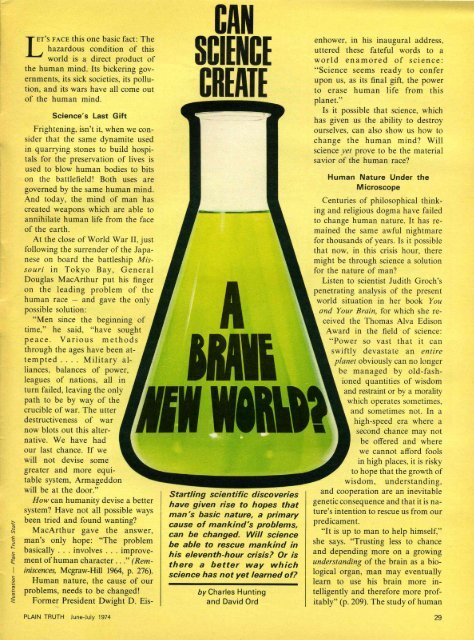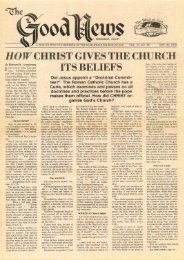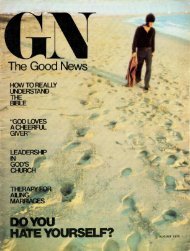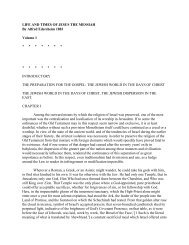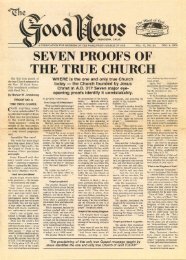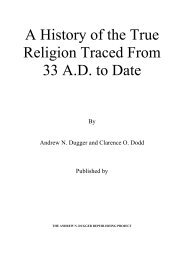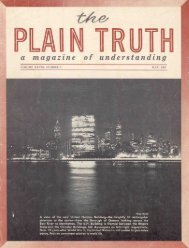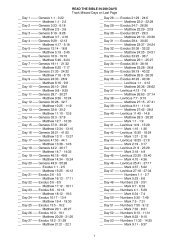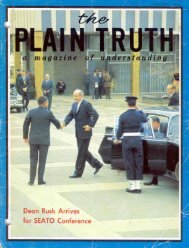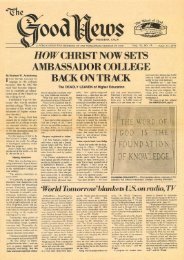Create successful ePaper yourself
Turn your PDF publications into a flip-book with our unique Google optimized e-Paper software.
TET'S FACE this one basic fact: The<br />
L hazardous condition of this<br />
world is a direct product of<br />
the human mind. Its bickering governments,<br />
its sick societies, its pollution,<br />
and its wars have all <strong>com</strong>e out<br />
of the human mind.<br />
Science's last Gift<br />
Frightening, isn't it, when we consider<br />
that the same dynamite used<br />
in quarrying stones to build hospitals<br />
for the preservation of lives is<br />
used to blow human bodies to bits<br />
on the battlefield! Both uses are<br />
governed by the same human mind.<br />
And today, the mind of man has<br />
created weapons which are able to<br />
annihilate human life from the face<br />
of the earth.<br />
At the close of World War II, just<br />
following the surrender of the Japanese<br />
on board the battleship Missouri<br />
in Tokyo Bay , General<br />
Douglas MacArthur put his finger<br />
on the leading problem of the<br />
human race - and gave the only<br />
possible solution:<br />
"Men since the beginning of<br />
time," he said, "have sought<br />
peace. Various methods<br />
through the ages have been attempted<br />
. . .. Military alliances,<br />
balances of power,<br />
leagues of nations, all in<br />
turn failed, leaving the only<br />
path to be by way of the<br />
crucible of war. The utter<br />
destructiveness of war<br />
now blots out this alternative.<br />
We have had<br />
our last chance. If we<br />
will not devise some<br />
greater and more equitable<br />
system, Armageddon<br />
will be at the door."<br />
How can humanity devise a better<br />
system? Have not all possible ways<br />
been tried and found wanting?<br />
MacArthur gave the answer,<br />
"l5 man's only hope: "The problem<br />
~<br />
. ~ basically .. . involves ... improve-<br />
~ ment of human character .. . " (Reminiscences,<br />
Mcgraw-Hill 1964, p. 276).<br />
Human nature, the cause of our<br />
problems, needs to be changed!<br />
Former President Dwight D. Eis-<br />
PLAIN TRUTH June-July 1974<br />
CAN<br />
SCIENCE<br />
CREATE<br />
A<br />
III<br />
Startling scientific discoveries<br />
have given rise to hopes that<br />
man's basic nature, a primary<br />
cause of mankind's problems,<br />
can be changed. Will science<br />
be able to rescue mankind in<br />
his eleventh-hour crisis? Or is<br />
there a better way which<br />
science has not yet learned of?<br />
by Charles Hunting<br />
and David Ord<br />
en hower, in his inaugural address,<br />
uttered these fateful words to a<br />
world enamored of science :<br />
"Science seems ready to confer<br />
upon us, as its final gift, the power<br />
to erase human life from this<br />
planet."<br />
Is it possible that science, which<br />
has given us the ability to destroy<br />
ourselves, can also show us how to<br />
change the human mind? Will<br />
science y et prove to be the material<br />
savior of the human race?<br />
Human Nature Under the<br />
Microscope<br />
Centuries of philosophical thinking<br />
and religious dogma have failed<br />
to change human nature. It has remained<br />
the same awful nightmare<br />
for thousands of years. Is it possible<br />
that now, in this crisis hour, there<br />
might be through science a solution<br />
for the nature of man?<br />
Listen to scientist Judith Groch's<br />
penetrating analysis of the present<br />
world situation in her book You<br />
and Your Brain, for which she received<br />
the Thomas Alva Edison<br />
Award in the field of science:<br />
" Power so vast that it can<br />
swiftly devastate an entire<br />
planet obviously can no longer<br />
be managed by old-fashioned<br />
quantities of wisdom<br />
and restraint or by a morality<br />
which operates sometimes,<br />
and sometimes not. In a<br />
high-speed era where a<br />
second chance may not<br />
be offered and where<br />
we cannot afford fools<br />
in high places, it is risky<br />
to hope that the growth of<br />
wisdom, understanding,<br />
and cooperation are an inevitable<br />
genetic consequence and that it is nature's<br />
intention to rescue us from our<br />
predicament.<br />
"It is up to man to help himself,"<br />
she says. "Trusting less to chance<br />
and depending more on a growing<br />
understanding of the brain as a biological<br />
organ, man may eventually<br />
learn to use his brain more intelligently<br />
and therefore more profitably"<br />
(p. 209). The study of human<br />
29


